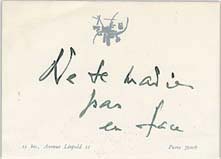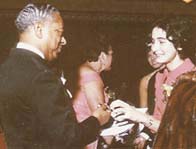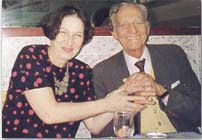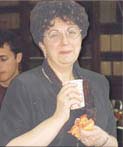|
Georges Mathieu
Painter of Lyric abstraction, friend of artists like Pollock, actor in his daily life, extremely well-read, author of the Privilège d’être (« The Privilege of Being »), Georges Mathieu liked my book Ave Lucifer, and, since then, we have seen eachother quite often in his little mansion/palace in the street Léopold II, especially when I was working under his windows, at the TV Department of Research. One day, who knows why, maybe because I was often abroad, we stopped having tea in his violin “triclinium”. Recently I saw a very impressive and moving retrospective of his work at the Museum of Orangerie, near the Place de la Concorde, and I sent him a letter but… it was returned to sender.
 to see the drawings to see the drawings
Tania Maximova-Ivanov, princesse Sviatopolsk-Mirski
Tania sang at the Tsarevitch « Les Chrysanthèmes » (« The Chrysanthemums ») and « Sois pas jaloux sois pas fâché » (« Don’t be jealous, don’t be angry »). She was a « grande dame » in the old way, with knowing smiles to the lovers, and she died in a suburb of Paris, Levallois-Perret. She was one of the last “Ladies of Night”, Russian version.
Adam Mishnik
Adam Mishnik was almost thirty years old, when I met him for an interview in Warsaw, in 1976. I had gone back for the Conference of Cracow, when writing my book on Droit d’asiles en Union Soviétique (« The Right of Asylums in the Soviet Union »). I remember the feeling of emotion when, each sunday morning, churches had their doors completely open: the entire city became a kind of huge cathedral, uniting in the same prayer for freedom those who believed in church and those who didn’t believe in it. And I remember Mishnik, an historian and journalist, and tireless Resistant, who has now become one of Poland’s leaders. He was in jail before and after I saw him – six years in total. For him, everything started in 1968, in Prague and Warsaw. And I remember how deeply shocked I was, seeing in Paris all these sons of the bourgeoisie, who uprooted the trees in the Boulevard Saint-Michel, near the Sorbonne, or all these children of a free world abandoning themselves to the delights of totalitarian language, while, over there, in the East, Czech students were burning themselves in order to protest against precisely this same totalitarian language – asking just for a “return to normal” as Mishnik said. Companion of Walesa, he pleads now for a secularized and democratic Poland, able to protect its proper genius in Europe.
Henri de Monfreid
I did the interview with this man, a bit of a pirate, in any case great adventurer on the seas, when I was twenty or so. In 1911, he had embarked, for the first time, as buccaneer, in Djibouti. At his age, more than half-a-century later, he was still so spry and seductive that I redid my hair, the heart beating and the cheeks quite pink. On the boat that he had constructed with his own hands, the Altair, he had visited every corner of « The Secrets of the Red Sea », Les Secrets de la mer Rouge (1932), and participated many times in the “Cruises of Hashish”, the book La Croisière du Haschisch was published in 1937. He trafficked arms, converted to Islam and adopted an Arab name which meant “The Slave of Life”. Very fond of Ethiopia, but chased out by Negus in 1933, supporter of Benito Mussolini, he quietened down after the war and published many other books before dying in his sleep at the age of 95 years.
Gaston Monnerville
 Gaston Monnerville(1897-1911) was President of the Senate and a friend of my father (they knew eachother when my father was the President of the Association of Students, and Monnerville, President of the Association of Young Lawyers). My father admired him because Monnerville achieved the closing down of the penal colony at Cayenne (French Guyana).When I met him I was fourteen years old, and it was such encounters (he and reporter and writer Joseph Kessel – another of my father’s friends) that sparked my interest in the vocation of journalist. Gaston Monnerville(1897-1911) was President of the Senate and a friend of my father (they knew eachother when my father was the President of the Association of Students, and Monnerville, President of the Association of Young Lawyers). My father admired him because Monnerville achieved the closing down of the penal colony at Cayenne (French Guyana).When I met him I was fourteen years old, and it was such encounters (he and reporter and writer Joseph Kessel – another of my father’s friends) that sparked my interest in the vocation of journalist.
Dominik Morawski
 « Corrispondente Della BBC Presso de la Santa Sede », as could be read on his business card, Morawski has for a very long time been correspondent for the Polish press at the Vatican. I met him when I was doing my film on Jesuits and I got, from that point on, all the info from him on the Vatican as seen from Poland or Poland as seen from the point of view of Vatican … « Corrispondente Della BBC Presso de la Santa Sede », as could be read on his business card, Morawski has for a very long time been correspondent for the Polish press at the Vatican. I met him when I was doing my film on Jesuits and I got, from that point on, all the info from him on the Vatican as seen from Poland or Poland as seen from the point of view of Vatican …
Pierre Motyl
In a fancy café in Jerusalem, I met this young Belgian man whose story I could not even guess silent as he was – myself being quite talkative. Knowing that I was looking for a room, he invited me to stay a few days in his flat, in the religious area of Maskereth Moshe, 27 rehov Rabbi Arie. Engineer in aeronautics, he had just gained his Ph.D. in the Sociology of Mass Media at the University of Jerusalem and was studying the influence of the media on the Peace process between Israel and Egypt. He served in the Israeli army. By chance, recently, I heard what happened to him afterwards: in 1981 he married a beautiful woman whom History had for long allocated him, as we say often in such paragraphs (« If chance…”). She was, in fact, the daughter of a woman whom Pierre’s father had saved from the ghetto of Warsaw; the woman survived with a false identity while Pierre’s parents stayed in the Ghetto until the insurrection, they were taken to Maidanek, jumped from the train, and – « by dint of successive hazards and the will to survive », as Pierre says– finished the war in Bergen-Belsen : « My father shared his litter in Belsen with a bright young guy who became one of the most renowned physicians, Stanislas Tomkiewicz. He wrote his autobiography under the title L’adolescence volée (« A Stolen Adolescence ») : did you know him in Paris ? The scenes of the hotel owned by Gestapo in Warsaw, and of the camps are, therefore, exactly the history of my parents.»
Thirty years later, we exchanged virtual messages and I have to say that my Ego boosted, if I believe his memories: « You wore a blue coat lined with ermine (yes I know, I exaggerate a little…) entirely befitting your flambuoyance, and everything in you made me think that you were the most beautiful woman I had ever met.». As for me, I remember gleaming talks and the best zabagliones (which he did with great art) I’ve ever tasted!
TOURIA MOUNA
 A bit of a tease sometimes, cheerful – here, she plays a girl off her trolley A bit of a tease sometimes, cheerful – here, she plays a girl off her trolley  - Touria is a rare kind of human being, a friend who is always there for you, curious about everything, speaks English and German, loves new (hot) countries and arts. Special friend of my daughter Charlotte, she shared many moments in our life and travels to Alsace, Brittany, Switzerland. Born in Oujda (Morocco) thirty years ago or so; French because she loves the country, she lives today in the heart of Anglican England, in Canterbury. Loving children, pedagogy, bridges between civilizations, she is eager to learn and to transmit. - Touria is a rare kind of human being, a friend who is always there for you, curious about everything, speaks English and German, loves new (hot) countries and arts. Special friend of my daughter Charlotte, she shared many moments in our life and travels to Alsace, Brittany, Switzerland. Born in Oujda (Morocco) thirty years ago or so; French because she loves the country, she lives today in the heart of Anglican England, in Canterbury. Loving children, pedagogy, bridges between civilizations, she is eager to learn and to transmit.
Claire Mouradian

Claire attended a course of François Georgeon, at the School of High Studies in Social Sciences (EHESS) in Paris, on Turkish and Ottoman society. Georgeon was then on the jury of my Ph.D. Claire is the expert in Armenian history and society (she wrote many books and articles on the topic), and, also, by the way, on the Soviet and Communist world. Therefore we talked together and she became a friend (she still is). She has a huge sense of humour and a rare kindness toward academics. She comes to my gypsies feasts, she invites me to her Caucasian lunches, and gives me the keys to understanding just a little the twists and turns of Georgian and Czerkess thoughts.
|



